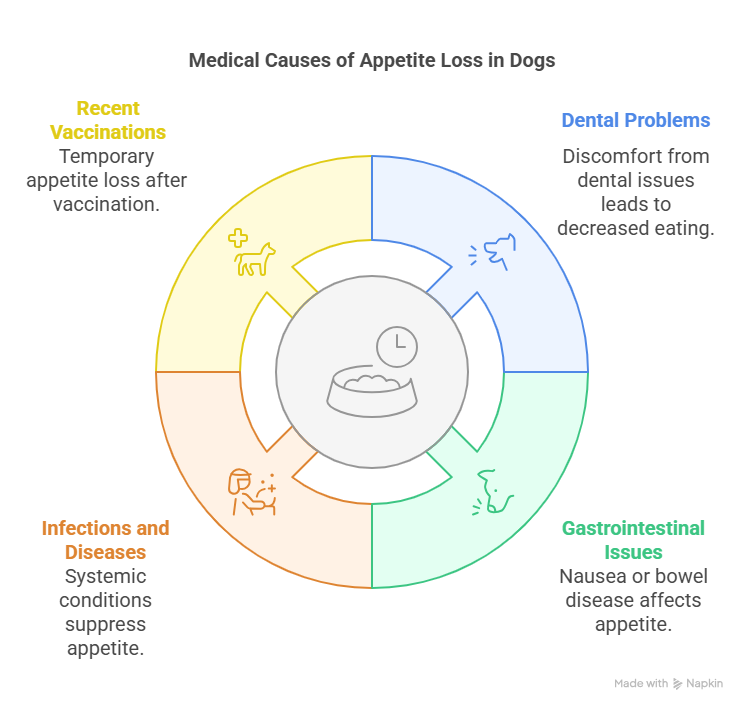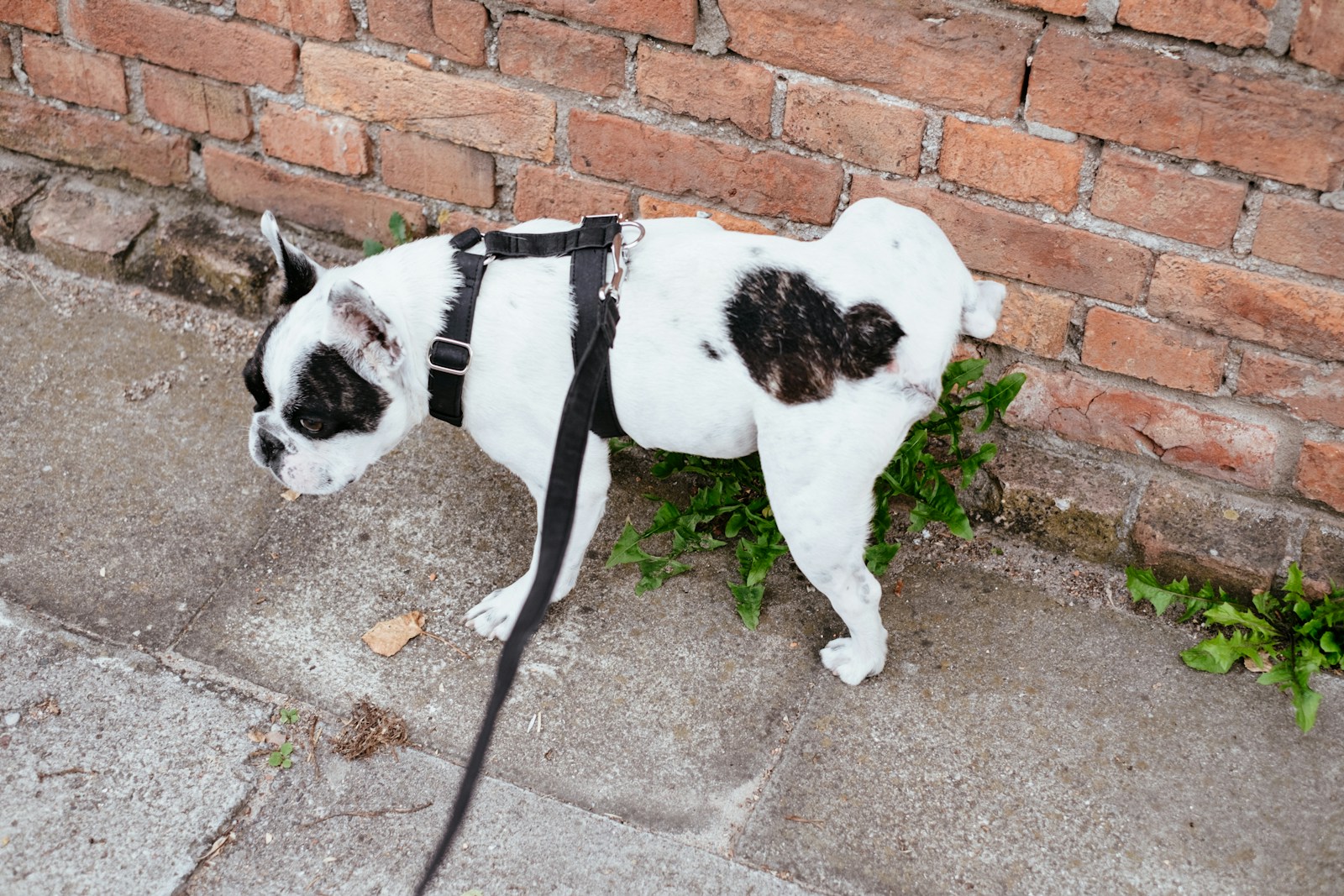Is your dog’s loss of appetite a sign of a serious health issue? As a pet owner, it’s natural to feel worried when your dog stops eating. A decrease in appetite can be due to various factors, ranging from medical issues to behavioral changes.
Understanding the reasons behind this behavior is crucial to helping your dog regain its appetite. In this article, we will explore the possible causes and provide guidance on how to support your dog.
By identifying the underlying cause, you can take appropriate action to ensure your dog’s health and well-being. Whether it’s a minor issue or a more serious condition, being informed is key to providing the best care for your pet.
Understanding When Dog Stops Eating
If your dog has stopped eating, understanding the reasons behind this behavior is crucial. A dog’s appetite is a significant indicator of its overall health, and a decrease in appetite can signal various underlying issues.
Medical Causes for Loss of Appetite
Several medical conditions can lead to a dog’s loss of appetite. These include:
Dental Problems and Oral Pain
Dental issues, such as toothaches or gum disease, can cause discomfort while eating, leading to a decrease in appetite.
Gastrointestinal Issues
Gastrointestinal problems, like nausea or inflammatory bowel disease, can also affect a dog’s willingness to eat.
Infections and Systemic Diseases
Infections, organ diseases, or systemic conditions can suppress a dog’s appetite.
Recent Vaccinations
Some dogs may experience a temporary loss of appetite after receiving vaccinations.

Behavioral and Environmental Factors
Besides medical causes, behavioral and environmental factors can also influence a dog’s appetite. These include:
Stress and Anxiety
Stress and anxiety can significantly impact a dog’s eating habits.
Changes in Routine or Environment
Changes in a dog’s environment or daily routine can cause a decrease in appetite.
Food Preferences and Pickiness
Some dogs can be picky eaters, refusing to eat if their food preferences are not met.
Age-Related Appetite Changes
A dog’s age can also affect its appetite. For instance:
Puppies vs. Senior Dogs
Puppies and senior dogs have different nutritional needs and appetite patterns.
Natural Appetite Fluctuations
It’s normal for dogs to experience fluctuations in appetite, but persistent loss of appetite is a concern.
How to Help Your Dog Regain Appetite
If your dog is refusing food, there are several steps you can take to encourage them to eat again. Understanding the reason behind their loss of appetite is crucial in determining the best course of action.
When to See a Veterinarian
It’s essential to know when your dog’s loss of appetite warrants a vet visit. If your dog shows severe symptoms or if you’re unsure about the cause, consulting a veterinarian is the first step.
Warning Signs That Require Immediate Attention
Some signs indicate that your dog needs immediate veterinary care. These include vomiting, diarrhea, lethargy, or difficulty breathing. If you notice any of these symptoms, seek veterinary help right away.
What to Expect at the Vet Visit
During the vet visit, your dog will undergo a thorough examination. The veterinarian may perform diagnostic tests to determine the underlying cause of the loss of appetite. Be prepared to provide detailed information about your dog’s symptoms, medical history, and feeding habits.

Home Remedies and Feeding Strategies
In addition to veterinary care, there are several home remedies and feeding strategies you can try to help your dog regain their appetite. Making their food more appealing is a good starting point.
Making Food More Appealing
Try adding warm water or low-sodium broth to their meals to make the food more palatable. You can also try warming up their food slightly to enhance the aroma.
Feeding Schedule Adjustments
Adjusting their feeding schedule can also help. Feeding smaller, more frequent meals can be less overwhelming for your dog.
Hand Feeding Techniques
Some dogs may be encouraged to eat through hand-feeding. This method can make mealtime more engaging and interactive.
Hydration Maintenance
Ensuring your dog stays hydrated is crucial. Encourage water intake by making fresh water readily available at all times.
Appetite Stimulants and Medications
In some cases, appetite stimulants or medications may be prescribed to help stimulate your dog’s appetite. Understanding the available options is essential.
Prescription Options
Your veterinarian may prescribe medications that can help stimulate your dog’s appetite. These are typically used when there’s an underlying medical condition causing the loss of appetite.
Natural Appetite Enhancers
There are also natural appetite enhancers available, such as certain supplements or foods specifically designed to stimulate appetite. Consult with your veterinarian before adding any new supplements to your dog’s diet.
By following these steps and consulting with a veterinarian, you can help your dog regain their appetite and ensure they’re receiving the necessary nutrients for optimal health.
Conclusion
Dealing with a dog that has stopped eating can be challenging, but understanding the causes and knowing how to help can make a significant difference. By identifying the potential reasons behind your dog’s loss of appetite, you can take the right steps to support their health.
When your dog stops eating, it’s essential to determine the underlying cause, whether it’s a medical issue, a behavioral problem, or an age-related change. Knowing when to seek veterinary help is crucial in addressing the issue effectively. If you’re wondering what to do when dog stops eating, trying various feeding strategies and consulting with a veterinarian can be beneficial.
With patience and the right guidance, you can help your dog regain its appetite and enjoy mealtime again. By following these steps and consulting with a veterinarian, you can help your dog feel better.
FAQ
Why has my dog stopped eating?
There are several reasons why your dog may have stopped eating, including medical issues such as dental problems, gastrointestinal issues, infections, and recent vaccinations, as well as behavioral and environmental factors like stress, anxiety, and changes in routine or environment.
How can I encourage my dog to eat?
You can try making their food more appealing, adjusting their feeding schedule, hand-feeding, and ensuring they stay hydrated. If the issue persists, consult with a veterinarian for professional advice.
When should I take my dog to the vet if they’re not eating?
If your dog shows severe symptoms such as vomiting, diarrhea, lethargy, or if you’re unsure about the cause of their loss of appetite, it’s crucial to consult a veterinarian. They can provide a proper diagnosis and recommend the necessary treatment.
Are there any appetite stimulants for dogs?
Yes, there are prescription appetite stimulants and natural enhancers available for dogs. Consult with a veterinarian to determine the best option for your dog.
Can a change in environment affect my dog’s appetite?
Yes, changes in routine or environment can cause stress and anxiety, leading to a loss of appetite in dogs. Try to minimize changes or help your dog adjust to new situations.
How does age affect a dog’s appetite?
A dog’s age can influence its appetite, with puppies and senior dogs having different needs and fluctuations. Puppies may have varying appetites during growth spurts, while senior dogs may experience a decrease in appetite due to age-related health issues.
What are some common medical causes for loss of appetite in dogs?
Common medical causes include dental problems, gastrointestinal issues, infections, and recent vaccinations. If you suspect a medical issue, consult with a veterinarian for a proper diagnosis.
Can stress and anxiety cause my dog to stop eating?
Yes, stress and anxiety can lead to a loss of appetite in dogs. Try to identify the source of stress and take steps to minimize it, or consult with a veterinarian or a dog behaviorist for guidance.






2 thoughts on “When Dog Stops Eating: Reasons and How to Help”